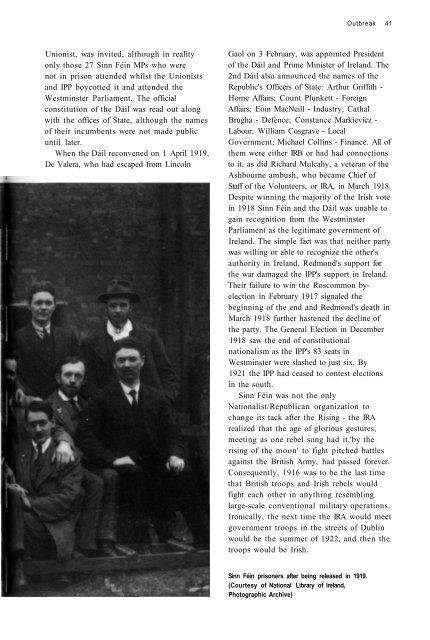Create successful ePaper yourself
Turn your PDF publications into a flip-book with our unique Google optimized e-Paper software.
Outbreak 41<br />
Unionist, was invited, although in reality<br />
only those 27 Sinn Féin MPs who were<br />
not in prison attended whilst the Unionists<br />
and IPP boycotted it and attended the<br />
Westminster Parliament. <strong>The</strong> official<br />
constitution of the Dáil was read out along<br />
with the offices of State, although the names<br />
of their incumbents were not made public<br />
until later.<br />
When the Dáil reconvened on 1 April 1919,<br />
De Valera, who had escaped from Lincoln<br />
Gaol on 3 February, was appointed President<br />
of the Dáil and Prime Minister of Ireland. <strong>The</strong><br />
2nd Dáil also announced the names of the<br />
Republic's Officers of State: Arthur Griffith -<br />
Home Affairs; Count Plunkett - Foreign<br />
Affairs; Eoin MacNeill - Industry; Cathal<br />
Brugha - Defence; Constance Markievicz -<br />
Labour; William Cosgrave - Local<br />
Government; Michael Collins - Finance. All of<br />
them were either IRB or had had connections<br />
to it, as did Richard Mulcahy, a veteran of the<br />
Ashbourne ambush, who became Chief of<br />
Staff of the Volunteers, or IRA, in March 1918.<br />
Despite winning the majority of the <strong>Irish</strong> vote<br />
in 1918 Sinn Féin and the Dáil was unable to<br />
gain recognition from the Westminster<br />
Parliament as the legitimate government of<br />
Ireland. <strong>The</strong> simple fact was that neither party<br />
was willing or able to recognize the other's<br />
authority in Ireland. Redmond's support for<br />
the war damaged the IPP's support in Ireland.<br />
<strong>The</strong>ir failure to win the Roscommon byelection<br />
in February 1917 signaled the<br />
beginning of the end and Redmond's death in<br />
March 1918 further hastened the decline of<br />
the party. <strong>The</strong> General Election in December<br />
1918 saw the end of constitutional<br />
nationalism as the IPP's 83 seats in<br />
Westminster were slashed to just six. By<br />
1921 the IPP had ceased to contest elections<br />
in the south.<br />
Sinn Féin was not the only<br />
Nationalist/Republican organization to<br />
change its tack after the Rising - the IRA<br />
realized that the age of glorious gestures,<br />
meeting as one rebel song had it,'by the<br />
rising of the moon' to fight pitched battles<br />
against the British Army, had passed forever.<br />
Consequently, 1916 was to be the last time<br />
that British troops and <strong>Irish</strong> rebels would<br />
fight each other in anything resembling<br />
large-scale conventional military operations.<br />
Ironically, the next time the IRA would meet<br />
government troops in the streets of Dublin<br />
would be the summer of <strong>1922</strong>, and then the<br />
troops would be <strong>Irish</strong>.<br />
Sinn Féin prisoners after being released in 1919.<br />
(Courtesy of National Library of Ireland,<br />
Photographic Archive)



